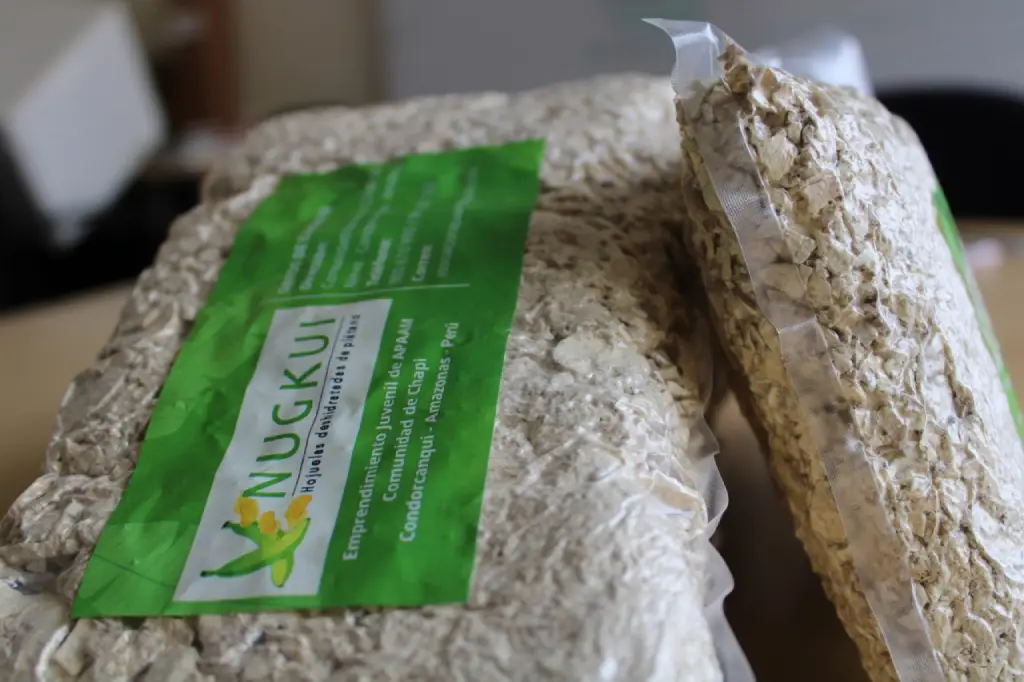
Emprendimientos de economía circular para un desarrollo sostenible
Transparencia de Fundació CODESPA Catalunya
Emprendimientos de economía circular: una oportunidad para el desarrollo sostenible
La economía circular es un modelo de producción y consumo que busca reducir al mínimo los residuos mediante la reutilización, recuperación, reciclaje y transformación de materiales y productos existentes. A diferencia del modelo lineal tradicional (producir–usar–desechar), este sistema alarga el ciclo de vida de los recursos y genera impactos ambientales, económicos y sociales positivos.
Los beneficios sociales y ambientales de la economía circular
La economía circular es especialmente relevante en comunidades rurales en situación de pobreza y contextos de vulnerabilidad porque:
- Genera empleo local a través del aprovechamiento de residuos, sobre todo agrícolas, y el uso eficiente de los recursos.
- Fomenta la autosuficiencia gracias al incremento de ingresos mediante productos con valor añadido, así como la innovación local.
- Reduce la dependencia de insumos externos como fertilizantes o energía.
- Empodera a colectivos vulnerables y los integra en cadenas de valor sostenibles.
- Disminuye el impacto ambiental, ya que los residuos agrícolas que se desechan normalmente se queman y generan gases altamente contaminantes, principalmente metano y dióxido de carbono, ambos considerados gases de efecto invernadero que contribuyen al cambio climático.
Emprendimientos de economía circular para fomentar el desarrollo sostenible
La experiencia de CODESPA, en países como Colombia, Ecuador, Filipinas, Marruecos y Perú, muestra que iniciativas que promueven los emprendimientos de economía circular pueden ofrecer una oportunidad de mejorar las condiciones de vida de personas en situación de exclusión. Ofrece a pequeños agricultores opciones alternativas de generación de ingresos al transformar residuos agrícolas, que normalmente se desechan o queman, en productos de mayor valor añadido con los que acceder al mercado y obtener un mejor precio por ellos. Estas iniciativas redundan en beneficio de las comunidades, ayudando a construir una economía más justa y sostenible.
CODESPA está llevando a cabo diversos proyectos para fomentar el desarrollo de pequeñas empresas de economía circular para combatir la pobreza y fomentar el desarrollo sostenible de comunidades vulnerables. Entre ellos, cabe mencionar:
- Productos derivados del plátano, en la Amazonía peruana. En las regiones de Amazonas y Cajamarca, en Perú, la mayoría de la población indígena vive en condiciones de pobreza. Por otro lado, aproximadamente el 70% de la producción de plátano, el principal producto comercializable en estas regiones, no cumple con los criterios de calidad óptima según los estándares de los compradores locales. Como resultado, parte de este excedente se desperdicia o se vende a precios muy bajos. CODESPA apoya a familias campesinas vulnerables en condiciones de pobreza promoviendo el desarrollo de emprendimientos, en colaboración con empresas peruanas. Con los excedentes de plátano que se desechan porque no cumplen con los estándares de calidad se producen, por un lado, productos alimentarios de gran valor añadido, como hojuelas deshidratadas y harinas, demandados en el mercado por su elevado valor nutricional. Y, por otro lado, se obtienen también biofibras textiles, derivadas del tallo del plátano, que se utilizan para producir artesanías y como materia prima muy demandada por el sector de la moda.

- Biofertilizantes derivados de las algas, en Filipinas. En la región de Caraga, en la isla de Mindanao, el 80% de la población habita en zonas rurales y el medio de vida de muchas familias es la producción artesanal de algas. Además, la zona costera de Mindanao sufre frecuentes inundaciones y tifones, lo que aumenta aún más la vulnerabilidad de sus habitantes. Tras un proceso previo de organización y formación técnica de los pequeños agricultores de algas, con la consiguiente mejora de la producción y la calidad de las algas, en una segunda fase se está promoviendo la producción de productos derivados de las algas de mayor valor agregado. En el proceso de secado de las algas se obtiene un líquido, que normalmente se desecha, con el que se elabora biofertilizante, que se podrá vender a empresas exportadoras y agricultores locales a un precio más elevado que las algas no procesadas. Además, al ser un producto natural y, por tanto, menos agresivo que los fertilizantes químicos, también ayudan en la regeneración del suelo y a mejorar la productividad de las cosechas de los pequeños agricultores.
- Biocombustible derivado de la caña de azúcar, en Colombia. El proyecto beneficia a personas que anteriormente se dedicaban a robar caña de azúcar de los ingenios azucareros y a venderla de manera informal. A través de la iniciativa de CODESPA, se ha transformado este problema en una solución, involucrando a estas personas en la recolección y el empaquetado de la hoja de caña —una corteza fina que recubre el tallo—, para luego venderla a los mismos ingenios como combustible para sus operaciones. De este modo, quienes antes representaban un desafío para las empresas ahora se han convertido en sus proveedores. Además de generar empleo e ingresos para estas comunidades, el uso de la hoja de caña como combustible natural es menos contaminante que los combustibles tradicionales empleados por la industria azucarera, lo que contribuye positivamente al medio ambiente.
La economía circular no solo conlleva beneficios desde un punto de vista ambiental, sino que también genera oportunidades económicas sostenibles, inclusivas y resilientes en contextos de pobreza. Iniciativas como las de CODESPA demuestran que, con innovación y enfoque comunitario, los residuos pueden convertirse en riqueza y las comunidades rurales en líderes del cambio.
La entrada Emprendimientos de economía circular para un desarrollo sostenible se publicó primero en Fundació CODESPA Catalunya.

Una segunda oportunidad para Patricia
El equipo del Instituto Jane Goodall (IJG) ha vuelto a viajar para salvar la vida de un bebé chimpancé. Esta vez, hasta Imphondo, una pequeña localidad en el norte de la República del Congo, donde los agentes del Departamento de Aguas y Bosques lo esperaban con una asustada y frágil cría de chimpancé que apenas pesaba 4,8 kg.
La pequeña Patricia, como la llamaron, había sido rescatada en circunstancias desoladoras. Aunque no sabemos cómo fue capturada ni que le ocurrió a su madre, lo más probable es que fuera arrebatada de sus brazos, como es habitual en tantas otras crías huérfanas víctimas de la caza furtiva y el tráfico ilegal. Por suerte, las autoridades pudieron rescatarla.
Cuando Aymard Moutete, jefe enfermero veterinario del Centro de Rehabilitación de Tchimpounga, llegó a Imphondo, se encontró con una chimpancé tímida e insegura que buscaba consuelo y protección. Y eso era lo que iba a conseguir Patricia en Tchimpounga.

Centro de Rehabilitación Tchimpounga (© IJG / Fernando Turmo)
Un nuevo hogar
Durante unos días, Aymard se quedó con Patricia en el pueblo, asegurando que estuviera estable hasta conseguir los permisos necesarios para poder volar a Tchimpounga. Allí la esperaban dos personas fundamentales en su recuperación: Chantal y Godelin, experimentadas cuidadoras del IJG que actuaron de inmediato como madres sustitutas, proporcionando a la pequeña el cariño y el cuidado que necesitaba día y noche.
Chantal y Godelin no se separaron de Patricia, como tampoco lo habría hecho su madre de estar en la selva, y poco a poco, la bebé fue adaptándose al nuevo entorno y comenzó a superar sus inseguridades.

chimpancés víctimas del tráfico ilegal (© IJG / Fernando Turmo)
Una nueva familia
Pasado el período de cuarentena, era el momento de que Patricia afrontara un nuevo reto: conocer al resto de infantes de Tchimpounga. Para ella, que había pasado tanto tiempo sola y aislada, este paso hacia su nueva vida era muy importante.
Patricia era la más pequeña, así que, con delicadeza fue introducida a sus nuevos amigos.

para sentirse protegida (© IJG / Fernando Turmo)
Desde entonces, Patricia ha pasado de estar sola a estar acompañada en todo momento.
Cuando los chimpancés rescatados salen con los cuidadores a explorar los bosques de Tchimpounga, Perrine, Tina y Ebelle, las mayores del grupo, se turnan para cuidarla y cargarla sobre sus lomos, porque a Patricia no le gusta caminar largas distancias sola. Se asusta y llora, hasta que alguno de sus amigos acude a abrazarla y consolarla.
Patricia no es la única
Patricia ha progresado mucho desde que llegó al Centro de Rehabilitación. En Tchimpounga, ha encontrado a su nueva familia. Pero aún se siente algo insegura: es muy pequeña y echa de menos el consuelo y protección de su madre.
Su caso no es el único.
Cada año, nuevas crías de chimpancé son cazadas y vendidas ilegalmente, y muchas mueren en el proceso. Se calcula que por cada bebé capturado de la selva, al menos 10 chimpancés adultos han sido asesinados al defenderlos.

Todavía hay muchos chimpancés como Patricia esperando su segunda oportunidad en la vida. Tú puedes ayudarnos a hacer posible el próximo rescate y devolver la esperanza a los bebés rescatados en Tchimpounga.
Hazte soci@ Chimpamig@, donante o teamer, para con tu apoyo marcar una diferencia en la vida de chimpancés que nunca debieron ser separados de sus hogares ni de sus familias.
NOTA: El IJG no aprueba el mascotismo de primates ni el contacto o la interferencia con chimpancés salvajes. Los chimpancés que interactúan con cuidadores profesionales en estas imágenes son huérfanos rescatados y viven en el Centro de Rehabilitación de Chimpancés del IJG en Tchimpounga, Congo.
Una segunda oportunidad para Patricia
La pequeña Patricia, como la llamaron, había sido rescatada en circunstancias desoladoras. Aunque no sabemos cómo fue capturada ni que le ocurrió a su madre, lo más probable es que fuera arrebatada de sus brazos, como es habitual en tantas otras crías huérfanas víctimas de la caza furtiva y el tráfico ilegal. Por suerte, las autoridades pudieron rescatarla.
Cuando Aymard Moutete, jefe enfermero veterinario del Centro de Rehabilitación de Tchimpounga, llegó a Imphondo, se encontró con una chimpancé tímida e insegura que buscaba consuelo y protección. Y eso era lo que iba a conseguir Patricia en Tchimpounga.

Centro de Rehabilitación Tchimpounga (© IJG / Fernando Turmo)
Durante unos días, Aymard se quedó con Patricia en el pueblo, asegurando que estuviera estable hasta conseguir los permisos necesarios para poder volar a Tchimpounga. Allí la esperaban dos personas fundamentales en su recuperación: Chantal y Godelin, experimentadas cuidadoras del IJG que actuaron de inmediato como madres sustitutas, proporcionando a la pequeña el cariño y el cuidado que necesitaba día y noche.
Chantal y Godelin no se separaron de Patricia, como tampoco lo habría hecho su madre de estar en la selva, y poco a poco, la bebé fue adaptándose al nuevo entorno y comenzó a superar sus inseguridades.

chimpancés víctimas del tráfico ilegal (© IJG / Fernando Turmo)
Pasado el período de cuarentena, era el momento de que Patricia afrontara un nuevo reto: conocer al resto de infantes de Tchimpounga. Para ella, que había pasado tanto tiempo sola y aislada, este paso hacia su nueva vida era muy importante.
Patricia era la más pequeña, así que, con delicadeza fue introducida a sus nuevos amigos.

para sentirse protegida (© IJG / Fernando Turmo)
Cuando los chimpancés rescatados salen con los cuidadores a explorar los bosques de Tchimpounga, Perrine, Tina y Ebelle, las mayores del grupo, se turnan para cuidarla y cargarla sobre sus lomos, porque a Patricia no le gusta caminar largas distancias sola. Se asusta y llora, hasta que alguno de sus amigos acude a abrazarla y consolarla.
Patricia no es la única
Patricia ha progresado mucho desde que llegó al Centro de Rehabilitación. En Tchimpounga, ha encontrado a su nueva familia. Pero aún se siente algo insegura: es muy pequeña y echa de menos el consuelo y protección de su madre.
Su caso no es el único.
Cada año, nuevas crías de chimpancé son cazadas y vendidas ilegalmente, y muchas mueren en el proceso. Se calcula que por cada bebé capturado de la selva, al menos 10 chimpancés adultos han sido asesinados al defenderlos.

por el tráfico ilegal de animales salvajes (© IJG / Fernando Turmo)
Hazte soci@ Chimpamig@, donante o teamer, para con tu apoyo marcar una diferencia en la vida de chimpancés que nunca debieron ser separados de sus hogares ni de sus familias.
NOTA: El IJG no aprueba el mascotismo de primates ni el contacto o la interferencia con chimpancés salvajes. Los chimpancés que interactúan con cuidadores profesionales en estas imágenes son huérfanos rescatados y viven en el Centro de Rehabilitación de Chimpancés del IJG en Tchimpounga, Congo.
La ESA transmite el Vals del Danubio Azul al espacio profundo

El 31 de mayo de 2025, la Agencia Espacial Europea (ESA) hizo historia al transmitir al espacio una interpretación en directo del Vals del Danubio Azul desde su antena de espacio profundo de Cebreros (España). Este gesto simbólico elevó el famoso vals de Johann Strauss II, a menudo considerado el «himno no oficial del espacio», al lugar que le corresponde entre las estrellas.

Sonidos de Limpio Sur brilló en «Suena Villa Elisa»
Este festival forma parte de una ruta musical que recorre el departamento Central, visibilizando el talento, la energía y la diversidad de comunidades que, con cada nota, hacen oír más fuerte sus voces y sueños.
Una experiencia artística, formativa y transformadora
Para muchas y muchos de los participantes, fue la primera vez que se presentaron ante un público numeroso. Lo hicieron con compromiso, emoción y una pasión que conmovió a todas las personas presentes.
Más allá de la presentación, esta vivencia fortaleció valores como:
- La autoestima y la confianza personal.
- El trabajo en equipo y la disciplina colectiva.
La expresión cultural como camino hacia la inclusión.
Participar de este tipo de eventos permite a niñas, niños y adolescentes reconocerse como agentes de cambio, vinculando el arte con su identidad, su historia y su comunidad.
El arte como derecho y motor de desarrollo
Sonidos de Limpio Sur es una iniciativa que promueve el acceso al arte y la cultura como derechos fundamentales para el desarrollo integral. Se implementa en el marco de la alianza entre Children Believe, Fundación Alda y Sonidos de la Tierra, con el apoyo del Fondo de Taiwán para la Niñez y las Familias (TFCF).
A través de este proyecto, buscamos que más niñas, niños y adolescentes tengan la oportunidad de expresarse, crecer y soñar en entornos seguros, participativos y creativos.
La entrada Sonidos de Limpio Sur brilló en «Suena Villa Elisa» se publicó primero en Fundacion Alda.







